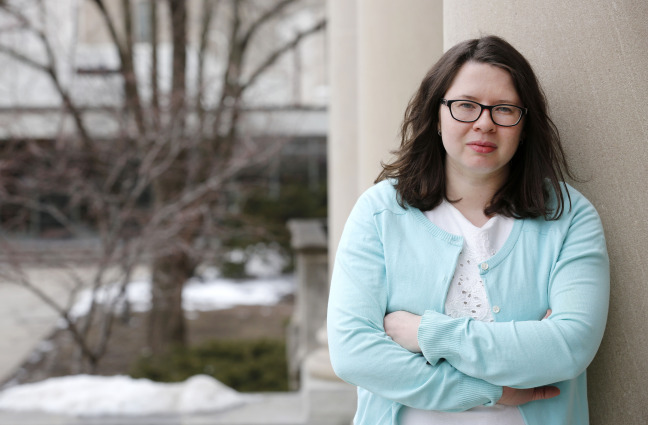
Amelia Karraker studies how different factors impact well-being later in life. Her latest study looks at illness and divorce. Photo by Christopher Gannon (Larger image)
RETRACTION: There was a major error in the coding of the dependent variable of marital status in this study. The conclusions should be considered invalid. A corrected version of the article will appear in the September 2015 issue of the Journal of Health and Social Behavior.
AMES, Iowa – Countless couples have recited the words, ‘in sickness and in health’ on their wedding day with the intention of honoring those vows. But as it turns out, that may be easier said than done.
A new Iowa State University study analyzed the divorce rate for couples in which either spouse was diagnosed with a serious illness. The study, published in the March issue of the Journal of Health and Social Behavior, found a 6 percent higher probability of divorce for couples in which wives got sick compared to marriages in which wives remained healthy. However, a husband’s illness did not increase the risk for divorce.
Amelia Karraker, lead author of the study and an assistant professor of human development and family studies at Iowa State, says the data does not explain why this is the case, but there are a few reasons why illness can add stress to a marriage. For example, the healthy spouse is often the primary caregiver and may have to take sole responsibility of managing the household.
“There is a difference between feeling too sick to make dinner and needing someone to actually feed you. That’s something that can really change the dynamics within a marriage,” Karraker said. “If your spouse is too sick to work, we know that financial strain is a major predictor of divorce in and of itself.”
Quality of care is another factor. Wives are generally less satisfied with the care from their husbands, Karraker said. That’s because men, especially older men, have not been socialized to be caregivers in the same way women have, and are less comfortable in that role.
Karraker and colleague, Kenzie Latham, an assistant professor at Indiana University–Purdue University Indianapolis, used data from the Health and Retirement Study, which does not indicate whether the husband or wife initiated the divorce. But it is possible some women are ending the marriage because of their care.
“Life or death experiences may cause people to re-evaluate what’s important in their lives,” Karraker said. “It could be that women are saying, ‘You’re doing a bad job of caring for me. I’m not happy with this, or I wasn’t happy with the relationship to begin with, and I’d rather be alone than be in a bad marriage.’”
Till death do us part?
More couples are getting divorced later in life, which may be a result of people living longer. In the past, some marriages would have ended because of widowhood instead of divorce, Karraker said. For comparison, she and Latham also looked at whether the marriages in their sample ended because the sick spouse died.
Of the 2,701 marriages included in their study, 32 percent ended in divorce, compared to 24 percent due to widowhood. The marriage data covered a nearly 20-year timeframe and one spouse had to be at least 51 years old at the beginning of that period. Divorce was more common when respondents in the study were younger, whereas death was more likely as respondents got older. Researchers found the probability of widowhood increased by 5 percent when husbands got sick and 4 percent when wives got sick.
Other studies have found married couples have better physical and mental health. Ironically, Karraker’s research shows that illness puts women at risk of losing those health benefits from marriage.
“I think the research shows the potential vulnerabilities for people in society who are sick. There is an elevated risk for depression with illness and now you’re also at risk for divorce,” Karraker said. “People in poor health may have less access to beneficial social relationships, which in turn can compromise their health further.”
Researchers focused the study on four illnesses – cancer, heart disease, lung disease and stroke – to determine if the type or severity made a difference in divorce rates. While there was some variation, the results for each individual illness were not statistically significant.
Karraker’s interest in studying illness and marriage was sparked by criticism of politicians, such as John Edwards and Newt Gingrich, for divorcing their sick wives. Through her work, Karraker has heard from women with similar experiences or women with friends who got divorced after illness.